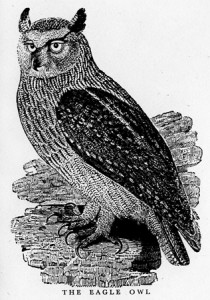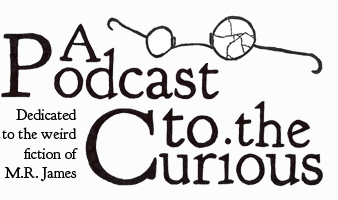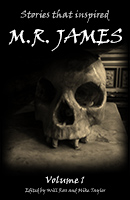 In this episode, talking owls. Yes, you heard me correctly. Talking owls.
In this episode, talking owls. Yes, you heard me correctly. Talking owls.
Has Monty completely lost his marbles? Mike and Will ask just that in this episode on ‘After Dark in the Playing Fields‘ by M.R. James.
Readings by kind permission of grand panjandrum and actor Robert Lloyd Parry!
The full reading of this story and many others can be found on Robert’s double-CD ‘Curious Creatures: The Shorter Horror of M.R. James‘ which is available to buy from nunkie.co.uk and is worth every penny.
Show notes:
- Story notes by Rosemary Pardoe (Ghosts & Scholars)
The ever-reliable Rosemary Pardoe has produced a very useful set of notes on this story. - Eton College, Windsor (various)
The action in this story takes places in the playing fields of Eton College, Windsor, where M.R. James was provost when he wrote this story. The story features various locations in close proximity to each other .Monty meets the owl “not far from Sheep’s Bridge“, the owl is unceremoniously dumped in Fellow’s Pond before Monty eventually helps him climb into Bad Calx Tree. - Eton Wall Game (etoncollege.com)
In this episdoe Mike and Will mention the Eton Wall Game, one of the odd traditions unique to Eton College. - A Midsummer Nights Dream (wikipedia)
The mischievous sprites and fairies in this story are inspired by those in A Midsummer Nights Dream. The owl grumpily quotes “come not near out fairy Queen” from Act 2 Scene 2. - The Five Jars by M.R. James (thin-ghost.org)
This is not the only James story to feature talking animals, sprites and goblins. His novel for children ‘The Five Jars‘ is cut from very much the same cloth as this story. - Daylight Saving Time (wikipedia)
In this story and in ‘A Neighbours Landmark’ James refers to daylight saving time, a relatively new concept in M.R. James’s lifetime. - Pathe News footage of Eton (BritishPathe.com)
There is some fascinating early video footage of Eton College at the time James was provost on the British Pathe website, including videos of the Eton Wall Game, Eton Steeplechase and even possibly some footage of Monty himself!
Podcast: Play in new window | Download
Subscribe: RSS
Tags: A Midsummer Nights Dream, After Dark in the Playing Fields, Eton College, M.R. James, Montague Rhodes James, Monty, Owls, Robert LLoyd Parry, Sheep's Bridge, Wall game








I am totally on the owl’s side here – fairies are, exucse my French, absolute bastards the lot of them. Irish mythology by itself is chock full of stories of fairies being fear-mongering slavedrivers and smug little arses.
I haven’t actually read this before, I think I tried once, though. I might give it a go now, though.
Love the podcast – found the link through Robert Lloyd Parry on Facebook. Looking forward to hearing the other podcasts 🙂
This story is difficult for me as it’s a departure to the Jamesian Wallop but Robert Lloyd Parry’s animated owl is so frigging great, I may actually try reading this again as well. In addition, it’s stories like these that does aid in it’s classification of Weird Fiction however, I’m proud of you both coming to terms with the re-naming of the show….it’s probably because you’re secretly looking for an Anglo Saxon crown, dissecting Warning has you questioning your very identity. I love the drama in the drama
If one were strict about the definition of a ghost, an immaterial spirit of a dead person, even quite a few of James’s more conventional stories wouldn’t be considered ghost stories. Quite a few of his are reasonably solid when they want to be, and several seem to be more semi-demonic entities than mere spirits of (even quite evil) humans.
An interesting change of pace, and a nearly Lovecraftian refusal to face the real horror, coupled with a very conventional approach to fairies… except that in the 1920s the general view of fairies was probably the fluffy Edwardian one, so making them common and nasty is a departure in itself.
When I first read this, it was when I was plunging through a collected works of MRJ volume. It did bring me up short, but I also found it especially creepy and peculiar, and stayed in my mind a lot longer than others. At that point, MRJ’s ‘standard’ stories had started to become very same-y, with painfully obvious recycling of plots and so forth. The change of tone for this one, and the complete lack of even an off-screen Jamesian Whallop, only led me to think that something especially horrible was being skirted carefully around.
Later, when I lived in a woods-surrounded house infested by owls(*), I actually thought of this story quite a few times. They were all much better neighbors than the Etonian owls, I have to say.
(* And by raccoons, but that’s another element of weirdness and horror entirely.)
I think this must be a Protestant owl. His objection to dancing, with the implication that it’s self-indulgent and far from respectable, has that flavour to it. It would go with the general quality of the story, the owl – natural and real – objecting to the supernatural, unreal fairies, matched with the tone of someone from a familiar and ordinary religion looking askance at the pagans.
I would like to say I much enjoyed this. Looking forward to when you get around to “The Five Jars”.
I’m pretty sure that the spirits “out of the water and the ground” are other fey beings rather than ghosts, especially as the community of fairies suggests beings more of the elemental ilk.
Regarding Wise Old Owls, the owner of a falconry centre (I think it was in Wales), who had been involved in training birds for various films, told a group of us that owls are, in fact, about as stupid as birds come, being unable to work out what you want them to do in exchange for the treat, and unable to remember it from one day to the next. Apparently almost any bird is more easily trained than an owl. (There is, of course, an argument that this demonstrates perfectly good sense on the part of the owl, who isn’t inclined to do any film work because of not getting a percentage of the gross takings.) She also said that they were evil tempered and inclined to peck and claw, so James may have been more accurate than he’s given credit for.